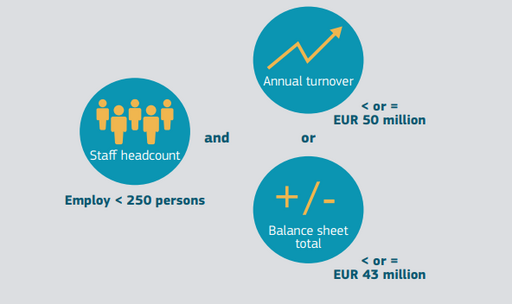What is an SME?

SMEs are the engine of the European economy. They drive job creation and economic growth and ensure social stability. In 2013, over 21 million SMEs provided 88.8 million jobs throughout the EU. Nine out of every 10 enterprises is an SME, and SMEs generate two out of every three jobs. SMEs also stimulate an entrepreneurial spirit and innovation throughout the EU and are thus crucial for fostering competitiveness and employment. Given their importance to Europe’s economy, SMEs are a major focus of EU policy. The European Commission aims to promote entrepreneurship and improve the business environment for SMEs, thereby allowing them to realise their full potential in today’s global economy.
The SME Definition takes into account the following three criteria:
- staff headcount
- annual turnover
- annual balance sheet total
The category of micro, small and medium-sized enterprises consists of enterprises which:
- employ fewer than 250 persons; and
- have either an annual turnover not exceeding EUR 50 million or an annual balance sheet total not exceeding EUR 43 million
Look at the 5 videos below, where you can hear Assistant Professor Tünde Cserpes talk about SMEs
1. The SME context: Organizational size
Review questions
Scenario: You are applying for a product manager position with a company. You would be employee number 51.
More information on the Performance Manager position
In 'Entering StartUpLand: An Essential Guide to Finding the Right Job', Jeff Bussgang gives an overview of what a product manager does and how the everyday tasks depend on the size of the firm.
If you want to know more about the PM role, check out the book here
2. The SME context: Organizational age and growth
3. Differences between working for an SME and a firm
4. Career consequences of getting a job at an SME
5. What can academic research tell us about the pros and cons of joining an SMEs?
Easy readings on the scaling startups topics
Gulati, Ranjai. 2019. The soul of a startup. 2019. Harvard Business Review. July-August: 85—91. https://hbr.org/2019/07/the-soul-of-a-start-up
Can startups scale up? (32 mins) https://www.youtube.com/watch?v=tWccFfgEo6w&ab_channel=ChicagoBoothReview
Horowitz, Ben. 2010. Taking the mystery out of scaling a company. https://a16z.com/2010/08/02/taking-the-mystery-out-of-scaling-a-company/
Hoffman, Reid, 2013. If, why, and how founders should hire a “professional” CEO. https://www.linkedin.com/pulse/20130123161202-1213-if-why-and-how-founders-should-hire-a-professional-ceo/
Burton, Diane M., Canales, Rodrigo, Dahl, Michael S. and Olav Sorenson. Startup Employees Take a Hit Financially. https://eiexchange.com/content/startup-employees-take-a-hit-financially?id=639
Why great startups pay higher salaries. https://medium.com/swlh/why-great-startups-pay-higher-salaries-60255c75aa1e
The referenced paper: https://isiarticles.com/bundles/Article/pre/pdf/84253.pdf